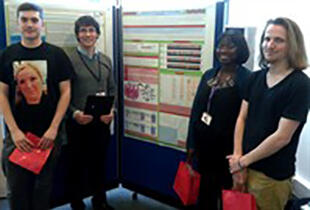
Masters in Biology and Control of Parasites and Disease Vectors student, Pelagie Boko, has won ‘Best Poster’ at LSTM’s Applied Bioinformatics Poster Day 2013. Pelagie presented a captivating and informative poster on Glutathione transferases (GST) sequence analysis, at the Applied Bioinformatics Poster Day event, held at LSTM today.
2nd prize went to Harry Pickering, a Masters in Molecular Biology of Parasites and Disease Vectors student who presented the poster: Characterising a hypothetical protein: Tb11.01.3540. With 3rd place going to George Forsbrook, another Masters in Molecular Biology of Parasites and Disease Vectors student, who presented a poster entitled: Bioinformatic Analysis of the origin of Brugia malayi Ferrochelatase 1.
Students participating were each given a different DNA ‘Mystery Sequence’ at the start of their study and asked to analyse it using the various tools and software they are exposed to and learn how to use during the module, presenting their findings in the form of a poster during an ‘in-house conference-style’ format in LSTM’s CTID building.
The ‘Mystery Sequences’ are all related to a research point of interest and importance from the area of tropical health and may include genes from parasites, vectors of disease and even venomous snakes. Organiser Dr James LaCourse said: “Students really enjoy the ‘detective element’ of discovery, the flexibility to construct a story around their gene sequence and the opportunity to present it all in an interesting way through a colourful poster and short presentations throughout the session; a skill that will undoubtedly serve them well in presenting their own future research at conferences in this very style.”
Staff and students from LSTM dropped by during the day to view the research posters and speak to the students presenting them. Many were impressed at the inventive and insightful analysis methods that students have performed on their genes, often providing ideas for exploring their own genes of interest.
LSTM ‘s short course on Applied Bioinformatics has proven extremely popular since it was introduced. Providing students with knowledge and critical understanding of modern technology platforms in bioinformatics and functional genomics and practical experience of computational methods used to interpret the output data.